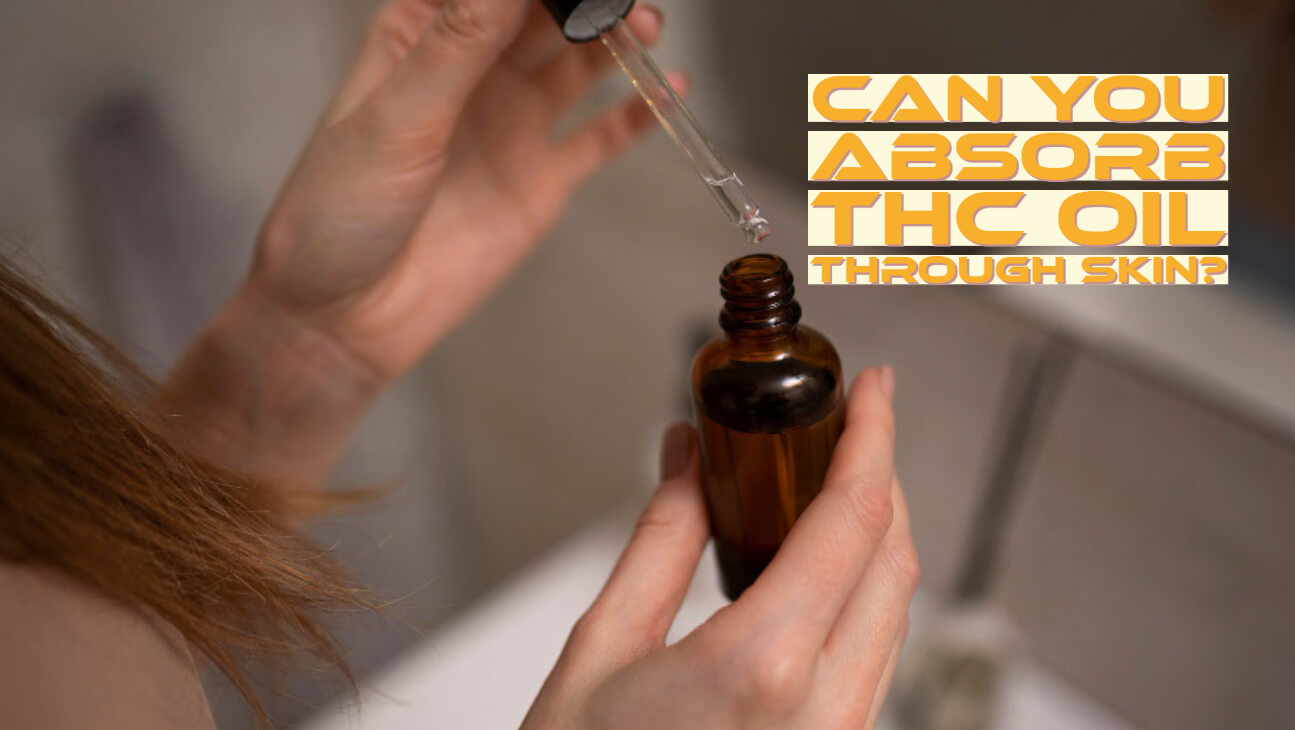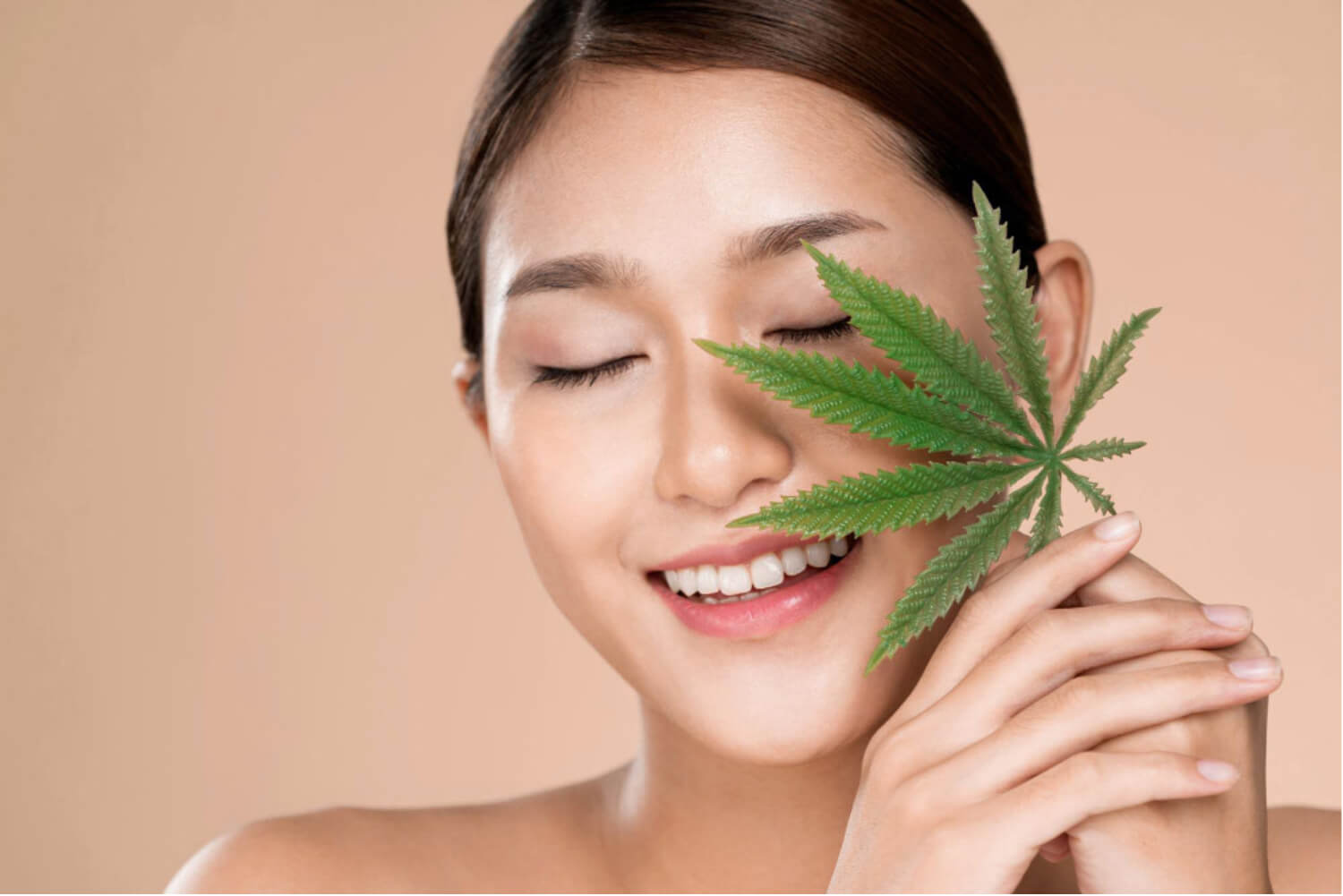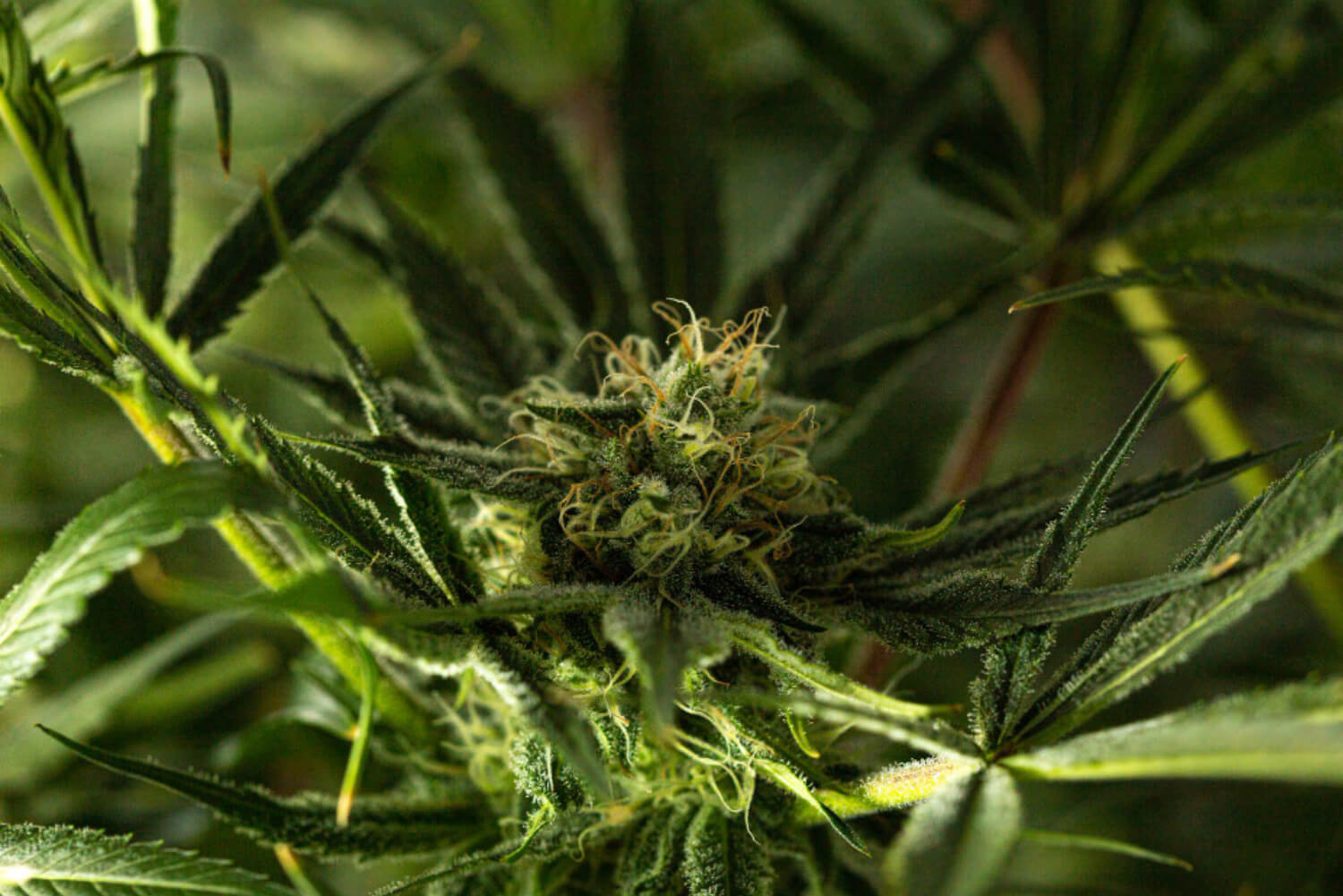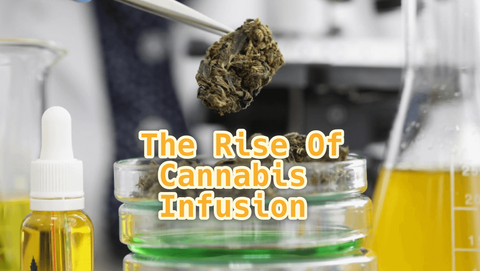Latest Blog Posts
Top rated

Can You Absorb THC Oil Through Skin?
The interest in the various methods of consuming cannabis and its derivatives is growing at the same speed as the attractiveness of cannabis and its products themselves. One concern that comes up rather frequently is whether or not THC (tetrahydrocannabinol) oil, which is a vital component of cannabis that is well-known for the psychoactive effects that it possesses, can be absorbed through the skin. This article will investigate the topic of transdermal absorption of THC oil, looking into its possibilities, limitations, and implications along the way.
Firstly, it is critical to have a solid understanding of what THC oil is and the role it plays in the context of the cannabis industry. THC, the primary psychoactive ingredient present in cannabis, may be extracted from the plant and concentrated into an oil, which can then be used for a variety of uses, including both therapeutic and recreational benefits. It is well known for its ability to cause a variety of effects, such as relaxation, pain alleviation, and euphoria, in its users.
The degree to which substances can pass through the skin, a process known as transdermal absorption, is one of the most critical factors determining how successful topical applications are. Even though the skin functions as a barrier, certain chemicals can get through the skin and into the bloodstream. This seeks whether or not THC oil, with its distinctive chemical features, can be absorbed through the skin and yet deliver the intended effects.
You will investigate the methods of skin absorption, including the many layers of the skin and the elements that influence transdermal absorption, in order to provide a solution to this topic. In order to obtain a better understanding of the possibilities presented by the transdermal absorption of THC, you will also discover the studies and research that have been undertaken on the topic.
This content will illustrate the usage of transdermal patches and topical treatments as delivery routes for THC, as well as the effectiveness of these ways in easing the body's ability to absorb the compound. This article's goal is to provide a full understanding of the transdermal absorption of THC oil by investigating the elements that affect absorption, as well as the potential advantages and hazards, legal considerations, and best practices.
The Oil That Has Received The Most Attention
Tetrahydrocannabinol, also known as THC, is a psychoactive compound that can be found in cannabis. This component is responsible for causing the "high" that is commonly associated with the use of marijuana. It is one of the cannabinoids found in cannabis that has received the most attention and research throughout the years. When THC is extracted and concentrated, it is frequently converted into a substance known as THC oil, which can come in a wide variety of forms and levels of potency.
THC is a naturally occurring chemical component that is classified as a cannabinoid. Cannabinoids are a class of chemicals. It does this by interacting with specific receptors in the brain and central nervous system called CB1 receptors, which then sets off a wide variety of physiological and psychological consequences.
THC is famous for its psychoactive effects and has been used in a variety of contexts, including the medical and recreational spheres. Because of its molecular structure and characteristics, it is highly lipophilic, which means that it has a solid attraction to fatty substances like oils and fats.
Types Of THC Oil
On the market today, you can get different kinds of THC oil, each of which has its own set of distinguishing qualities and uses. Full-spectrum THC oil is a popular variety, and it is distinguished by the presence of not only THC but also the other cannabinoids, terpenes, and plant components that are characteristic of cannabis. Both cannabis oil and other topical cannabis products are quite popular.
It is believed that full-spectrum THC oil has what is known as an "entourage effect," which is when the combination of a number of substances can potentially boost the overall therapeutic potential.
THC isolate Oil is another form, and it differs from other types in that it is made up of nothing but pure THC that has been separated from any additional chemicals. THC isolate oil is often used in situations in which precise dosing is required or in circumstances in which users desire to avoid the possible effects of other cannabinoids.
In addition, THC oils have various proportions of THC compared to the other cannabinoids present, such as THC/CBD oil. These oils combine the possible medicinal benefits of THC with those of CBD, another essential cannabinoid that is well-known for the fact that it does not produce psychoactive effects. Many people, though, are interested if cannabis consumption will bring a positive drug test. This is something that should be explored.
Typical Uses Of THC Oil
The uses for THC oil can be broken down into two categories: medical and recreational. It has been used in medicine to reduce symptoms linked with various illnesses, such as persistent pain, nausea, and vomiting brought on by chemotherapy, muscle spasms, and some neurological abnormalities. Additionally, individuals with diseases such as HIV/AIDS are occasionally given prescriptions for THC oil in an effort to enhance their appetite and acquire more weight.
THC oil is frequently used in the recreational field to bring about feelings of relaxation and ecstasy and heighten one's awareness of their senses. THC oil is used recreationally by a lot of people because it has the ability to give them a euphoric "high" and helps them relax after a long, stressful day.

It is essential to be aware that the legal status of THC oil differs significantly from one country to the next. In some places, its use is subject to strict laws, and it is either restricted to the medical field or outlawed entirely. As a result, it is essential to understand and comply with the rules and regulations that regulate THC oil in your area. Moreover, it's important to explore information on drug tests. Each drug test is unique.
Skin Absorption
Substances, such as chemicals or drugs, can be absorbed through the skin and into the circulation or the tissues that lie beneath the surface of the skin through a process known as "skin absorption."
As it is the largest organ in the body, the skin not only acts as a barrier of defense against the environment but also plays an essential part in maintaining the correct temperature inside the body. In order to comprehend the potential for transdermal absorption of substances such as THC oil, it is vital to have a fundamental understanding of skin absorption, as well as the elements that influence it and the distinct layers of skin.
The Fundamentals Of Skin Absorption
The body's surface comprises numerous layers, each of which has its own set of traits and functions. The topmost layer is called the stratum corneum, and it is made up of dead skin cells that work together to create a barrier that prevents harmful chemicals from entering the body.
The epidermis can be found just below the stratum corneum, followed by the dermis, and the subcutaneous tissue. The stratum corneum is the primary site through which the skin absorbs substances since it is responsible for determining which compounds can pass through to the deeper layers of the skin.
Skin Absorption Can Be Affected By A Number Of Factors
The extent and pace of skin absorption are both affected by a number of different factors. The physicochemical qualities of the substance being applied are among the most critical factors. The molecular size, lipophilicity (affinity for fat or Oil), and molecule solubility, for instance, all affect the substance's capacity to enter the skin.
In addition, the absorption rate can be affected by the substance's concentration or dose, the length of time that it is applied, and the number of times that it is applied. The condition of the skin, the existence of hair follicles and sweat glands, as well as the use of occlusive or permeation-enhancing chemicals, are all additional aspects to consider.
Different Layers Of The Skin
The layers of the skin each perform a specialized role, and together these layers make up the skin. Corneocytes are dead skin cells that are found in the stratum corneum, which is the most superficial layer of the skin. Corneocytes are tightly bound together. This layer functions as a physical barrier, preventing the majority of chemicals from passing through it.
The epidermis is located below the stratum corneum. It is composed of live cells that are accountable for the generation of keratinocytes, melanocytes (which are responsible for the pigmentation of the skin), and immune cells. The dermis is located even deeper than the epidermis; it is the layer of the skin that contains blood vessels, nerves, hair follicles, and sweat glands.

The dermis is responsible for temperature regulation and also supports the skin's structure. Last but not least, the subcutaneous tissue, also called the hypodermis, is made up of fat cells that act as an insulator and cushion for the body.
The fundamentals of skin absorption, as well as the elements that govern it and the distinct layers of skin, are essential to understand since they help throw light on the possibility of chemicals such as THC oil breaching the skin barrier. By examining these factors and their implications, you can gain insights into the transdermal absorption potential of THC oil and its effectiveness as a topical delivery method.
Absorption Of THC Oil Through Skin
The transdermal absorption of THC oil, also known as the capacity of THC to permeate the skin and enter the bloodstream, generates a lot of attention and controversy. Exploring the potential of THC oil as a topical application requires first understanding whether or not it is possible for the skin to absorb THC oil efficiently.
Studies have revealed that THC, due to its lipophilic nature, may have the ability to penetrate the skin under specific conditions. This is despite the fact that the skin functions as a protective barrier against compounds that are introduced from the outside. However, research is still being conducted to determine the level of penetration and whether or not it is possible to achieve therapeutic concentrations in the bloodstream.
Mechanisms Of Absorption
Complex mechanisms are involved in the process of THC oil being absorbed through the skin. THC molecules have been shown to penetrate the lipid-rich stratum corneum and penetrate deeper layers of the skin via a mechanism known as the intracellular pathway.
This is one of the potential ways of absorption. Another possible way for THC oil to enter the bloodstream is through the hair follicles and sweat glands, both of which can serve as passageways for the substance.
Studies On Transdermal Absorption Of THC
Investigations into the transdermal absorption of THC have been carried out in a number of different studies. It has been demonstrated through research that THC may be found in the bloodstream after topical treatment, which indicates that it can overcome the barrier provided by the skin. However, the rate of absorption might change based on a number of factors, including the amount of THC included in the product, how it is formulated, and the health of the user's skin.
In addition, research has been done on the topical use of THC in the form of applied transdermally patches. The cannabinoid tetrahydrocannabinol (THC) has been incorporated into transdermal patches to promote regulated release and systemic absorption. These patches often have a reservoir or matrix containing THC oil and are designed to slowly release the active ingredient into the skin over a predetermined period.
Even though there is evidence to suggest that THC can be absorbed through the skin, it is essential to point out that the study on THC's efficiency and bioavailability when administered through this method is still ongoing. The degree of absorption and the following effects can be affected by various factors, including the exact composition of the THC oil product, the concentration of the oil used, and the condition of the user's skin.
In order to gain a deeper understanding of the transdermal absorption of THC oil and its potential as a workable delivery technique, additional research and clinical studies are required.
Transdermal Patches And Topical Products
The distribution of THC oil through the skin is often accomplished using one of two main methods: either transdermal patches or topical treatments. In order to investigate the practicability and prospective benefits of using THC oil topically, it is essential to understand their properties, effectiveness, and absorption capacity.
Transdermal patches are intended to stick to the skin and then gradually release the active components for a specific period. These patches typically include a backing layer, a reservoir or matrix containing the THC oil, an adhesive layer, and a protective covering. The backing layer acts as a support for the other layers. The THC oil included within the patch is designed to be absorbed through the skin and into the bloodstream to provide a steady and well-regulated dose of the psychoactive component of cannabis.
Efficiency Of Transdermal Patches For The Consumption Of THC
The ability of transdermal patches to give a prolonged release of the active ingredient in THC has contributed to their rise in popularity as a means of using psychoactive substances. Because the THC in the patch is applied directly to the skin, it can potentially prevent the first-pass metabolism that occurs in the liver.
This results in improved bioavailability, and it also has the potential to avoid the euphoric effects that are associated with other intake methods. The constant release of THC from the patch enables a more controlled and extended impact, making it suited for controlling chronic pain or giving long-lasting relief. As a result, the patch can be applied for a more extended period.
Topical Products And Their Absorption Potential
Another well-liked method for localized administration is the use of topical products that include THC oil, such as creams, lotions, balms, or oils. This method is becoming increasingly common. Because of these products' possible analgesic and anti-inflammatory effects, they are often administered by applying them directly to the skin in the affected area.
The potential for absorption of topical treatments can change depending on several factors, including the formulation, concentration, and current condition of the skin. Even while the skin can serve as a barrier that prevents chemicals from entering the bloodstream, there is evidence from some studies that certain compounds included in topical therapies can still permeate the skin and make their way to the underlying tissues.
It is essential to keep in mind that the efficacy and absorption potential of topical medicines and transdermal patches might vary depending on several factors, including the formulation, concentration, application technique, and variation among individuals. In addition, the particular legislation and legal considerations regarding using THC oil in these products may differ from one country to the next.
THC Oil's Penetration Into The Skin
The question of whether THC oil can be absorbed through the skin is a topic of interest and discussion among cannabis enthusiasts and medical professionals alike. While the skin is a barrier designed to protect the body, it can also absorb certain substances, including medications and compounds found in topical products.
Regarding THC oil, the potential for skin absorption exists, albeit with some limitations. THC, the psychoactive compound found in cannabis, has a relatively large molecular size, making it challenging to penetrate the skin's outermost layer, known as the stratum corneum. This layer is composed of dead skin cells and acts as a protective barrier against foreign substances.
Studies have suggested that THC oil can indeed be absorbed through the skin under certain conditions. Factors such as the concentration of THC, the presence of carrier substances or penetration enhancers in the formulation, and the integrity of the skin can influence the extent of absorption. Higher concentrations of THC and the use of permeation-enhancing substances may increase the likelihood of absorption.

Furthermore, the different layers of the skin also play a role in absorption. While the stratum corneum acts as a barrier, the underlying layers, such as the epidermis and dermis, contain blood vessels and can facilitate the absorption of substances into the bloodstream.
It is important to note that the absorption of THC through the skin is generally considered to be slower and less efficient compared to other routes of administration, such as inhalation or oral consumption. Transdermal patches and topical products are specifically designed to enhance the absorption of THC through the skin and provide localized effects. These products often utilize specialized formulations and technologies to optimize absorption and deliver a consistent dose of THC.
Factors Affecting Absorption
When it comes to determining how well THC oil is absorbed via the skin, a number of different factors play a significant part. To evaluate the efficacy of transdermal absorption as a delivery mechanism for THC and to determine its potential, it is vital to have a solid understanding of these factors.
Concentration Of Oil Containing THC
Absorption can be considerably affected by factors such as the concentration or dose of THC oil that is administered topically. The quantity of THC that is available for absorption may be increased at higher dosages, which could increase the substance's bioavailability. There may be saturation points or other limitations in the skin's ability to absorb higher levels of THC. However, it is crucial to remember that overly high concentrations may not necessarily correlate to more excellent absorption.
Carrier Substances And Formulations
The composition of THC oil products and the carrier substances chosen to be employed in those products can affect absorption. Altering the skin's barrier characteristics or increasing the skin's solubility are two ways in which certain chemicals, such as lipids, oils, or specialized penetration enhancers, might make it easier for THC to pass through the skin and into the bloodstream. Absorption could be improved by utilizing proper formulations that maximize the interaction between THC and the skin.
Skin Condition And Integrity
The health and structure of the skin have been shown to have a substantial bearing on how well the body absorbs THC oil. Dryness, eczema, and wounds are all skin disorders that can affect the skin's barrier function, which could lead to increased absorption.
On the other hand, skin that has a barrier function that is still intact and healthy may offer a higher level of resistance to the penetration of chemicals. Both the rate and the extent of absorption can be affected by other factors as well, such as the thickness of the skin, the level of hydration, and the existence of hair follicles and sweat glands.
The length of time the product is left on the skin and how often it is applied are additional factors that may affect absorption. An increase in the total amount of THC that is absorbed may result in prolonged exposure or repeated applications. Individual variability, which may include aspects such as age, gender, and heredity, may also play a role in THC oil absorption rates and responses.
When studying the topical use of THC oil, it is essential to consider all of these considerations. The extent of absorption and how well it works are ultimately determined by the interaction between the concentration of the chemical, the carrier substances it is carried by, and the skin condition.
When these parameters are understood, it will be possible to develop improved formulations and delivery systems that will increase the bioavailability of THC oil and its potential as a medicinal agent when it is administered topically.
Potential Benefits Of Transdermal THC Delivery
The topical application of tetrahydrocannabinol (THC) has many possible advantages, making it an intriguing choice for people who want therapeutic effects from cannabis but don't want to use conventional intake methods. Transdermal THC delivery can provide focused relief and unique advantages because it bypasses the digestive system and delivers THC straight into the bloodstream through the skin rather than through the mouth and stomach.
Pain Management
The ability of transdermal THC administration to provide potentially effective pain control is one of the most significant advantages it offers. THC, which is well-known for its analgesic effects, has the potential to interact with the endocannabinoid system of the body, which is involved in regulating pain perception.
Individuals can directly target parts of their bodies that are experiencing pain, such as painful muscles or joints when they apply THC topically via transdermal patches or other topical medicines. Transdermal THC administration has the potential to give long-term pain treatment thanks to its delayed release and persistent effects, making it a viable alternative to conventional pain medicines.
Localized Relief
Because it is possible to achieve localized treatment with transdermal THC delivery, this method is beneficial for addressing specific areas of discomfort or inflammation. People are able to target localized pain, swelling, or skin issues by administering THC topically to the affected area.
This prevents the THC from affecting the entire body. In illnesses such as arthritis, dermatitis, or muscular strains, a targeted therapy such as this can be helpful when localized treatment without systemic consequences is required.
Avoiding The Psychoactive Effects
Another possible advantage of transdermal THC delivery is the possibility of enjoying the therapeutic effects of THC without the intense psychoactive "high" that is generally associated with other intake techniques. This is because THC is absorbed through the skin rather than the mouth or nose.
Products that contain transdermal THC are designed to give a controlled and progressive release, which ensures that a consistent amount of THC is absorbed into the bloodstream. This controlled release can assist individuals in attaining the therapeutic advantages that are needed while also limiting the psychoactive side effects that certain individuals may find to be undesirable.
In addition, the THC distribution using transdermal patches has the benefits of being both convenient and covert. It is possible to use patches or topical medicines without drawing attention to oneself, and they are simple to incorporate into an individual's regular routine.
It is essential to keep in mind that the precise advantages and consequences of receiving THC through transdermal delivery may differ from person to person and that individual reactions may be influenced by factors such as dosage, formulation, and personal tolerance. Furthermore, it is vital to give some thought to the legal rules and requirements that are associated with the use of THC products in the state in which you live.
Alleviating Chronic Pain: Exploring The Potential Of THC Oil For Pain Management
Chronic pain is a debilitating disorder that affects millions of people all over the world and has a substantial impact on the quality of life these individuals lead. THC oil has recently come to attention as a possible friend in the quest for more efficient pain management. It has been known for a long time that THC, the principal psychoactive ingredient in cannabis, also possesses analgesic qualities. THC interacts with the body's endocannabinoid system, which is an essential component in controlling how one experiences pain, whether it is eaten orally or when it is given topically.
Because it can attack pain where it originates, THC oil presents a promising new approach to treating chronic pain. THC oil has the potential to have a direct effect on the cannabinoid receptors that are found beneath the skin, in the muscles, and in other subcutaneous tissues when it is applied topically.
Individuals are able to receive tailored alleviation thanks to this localized technique, which is particularly helpful for ailments such as arthritis, muscular strains, or neuropathic pain. THC's pain-relieving effects are further contributed to by the fact that it possesses anti-inflammatory qualities. These features help reduce swelling and inflammation, both of which are connected with several chronic pain problems.
In addition, compared to conventional pain drugs, THC oil may offer several different benefits. Numerous pharmacological pain medications, such as opioids, come with the risk of becoming addicted to them and developing a dependence on them.

On the contrary, THC oil that is extracted from cannabis plants might be a more reliable choice for the management of chronic pain. When applied topically, THC oil's intoxicating effects can be reduced, making it possible for people to reap the medicinal advantages of cannabis without experiencing considerable damage.
Although the use of THC oil for pain management has shown some promise, it is essential to remember that different people will react differently to it. The efficacy of THC oil can be affected by various factors, including the dosage, the formulation, and the individual's tolerance level.
To better understand the best application of THC oil for pain management and its potential in combination with other treatment modalities, additional research and clinical studies are now being conducted. People who suffer from chronic pain might find hope in a natural option that may bring relief, enhance their general well-being, and restore their ability to participate in day-to-day activities with better comfort if they investigate the potential of THC oil.
Finding Relief: How THC Oil Can Aid In Managing Symptoms Of Anxiety And Stress
Anxiety and stress have become prevalent issues in today's fast-paced and demanding world, affecting millions. In pursuing effective solutions, THC oil has emerged as a potential ally in managing the symptoms associated with these mental health challenges. THC, the psychoactive compound found in cannabis, interacts with the body's endocannabinoid system, which is crucial in regulating mood and emotions.
THC oil offers potential benefits in managing anxiety and stress due to its ability to modulate the activity of neurotransmitters in the brain, such as serotonin and dopamine. These neurotransmitters regulate mood, emotions, and the body's stress response. By interacting with the endocannabinoid system, THC oil may help restore balance and alleviate the symptoms of anxiety and stress.
Research has shown that THC can produce anxiolytic effects, reducing feelings of apprehension, worry, and tension. THC oil can induce relaxation and calmness, promoting a more positive state of mind. Additionally, THC oil may enhance the production of endorphins, which are natural mood-lifting compounds, further contributing to the potential alleviation of anxiety and stress symptoms.
However, it is essential to note that the effects of THC on anxiety and stress can be dose-dependent and vary among individuals. While lower doses of THC may offer calming effects, higher doses may potentially exacerbate anxiety symptoms in some individuals. Finding the proper dosage and strain of THC oil that works best for each person is crucial, and it is advisable to consult with a healthcare professional knowledgeable in cannabis medicine.
Furthermore, it is worth mentioning that THC oil should not be seen as a standalone treatment for anxiety or stress but rather as a complementary approach to a comprehensive wellness plan. Incorporating stress management techniques, counseling, and lifestyle modifications alongside THC oil usage can lead to more holistic and sustainable results.
Enhancing Sleep Quality: The Benefits Of THC Oil For Insomnia And Sleep Disorders
Sleep is essential for overall well-being, yet many individuals struggle with insomnia and other sleep disorders that disrupt their ability to achieve restful sleep. In the quest for effective solutions, THC oil has garnered attention for its potential benefits in improving sleep quality. THC, the primary psychoactive compound found in cannabis, interacts with the body's endocannabinoid system, which plays a vital role in regulating sleep patterns and promoting relaxation.
THC oil holds promise in addressing insomnia and sleep disorders due to its ability to induce a state of relaxation and promote sleepiness. When consumed or applied topically, THC interacts with the brain and central nervous system receptors, influencing neurotransmitters and signaling pathways involved in sleep regulation. THC oil can help individuals unwind and prepare for a more restful sleep experience by promoting relaxation and reducing anxiety.
Furthermore, THC oil may decrease the time it takes to fall asleep, increase the overall duration of sleep, and improve sleep continuity. THC may act as a sedative, facilitating the onset and maintenance of sleep. Individuals with conditions such as insomnia, sleep apnea, or restless leg syndrome may find relief from the symptoms that disrupt their sleep patterns, allowing for a more rejuvenating and restorative sleep experience.
The Healing Power Of THC Oil
Inflammation and various skin conditions can cause discomfort and pain and affect the overall well-being of individuals. THC oil has gained attention in recent years for its potential healing properties in addressing these concerns. THC, the primary psychoactive compound in cannabis, interacts with the body's endocannabinoid system, which is critical in regulating immune responses, including inflammation.
One of the key potential benefits of THC oil is its ability to alleviate inflammation. THC interacts with cannabinoid receptors in the immune system and peripheral tissues, modulating the body's inflammatory response.
By reducing the production of pro-inflammatory molecules, THC may mitigate the symptoms associated with inflammation, such as redness, swelling, and pain. This anti-inflammatory effect makes THC Oil an appealing option for individuals suffering from conditions like arthritis, dermatitis, psoriasis, or eczema.
Moreover, THC oil has shown promise in managing skin conditions. The endocannabinoid system is present in the skin and plays a role in maintaining its health and balance. By interacting with the skin's cannabinoid receptors, THC oil may help regulate oil production, reduce excessive cell growth, and modulate immune responses, thereby potentially improving the symptoms of skin conditions. Research suggests that THC oil may have anti-pruritic properties, relieving itching associated with certain skin conditions.
THC oil's potential as a therapeutic agent for skin conditions extends to its antimicrobial properties. Studies have shown that THC exhibits antimicrobial effects against various bacteria and fungi, which may benefit individuals with skin infections or acne-prone skin.
The Bottom Line
The absorption of THC oil through the skin is a complex process influenced by various factors such as THC concentration, carrier substances, and skin integrity. While the skin acts as a protective barrier, it can potentially absorb THC under certain conditions. Transdermal patches and topical products formulated for enhanced absorption offer promising options for targeted relief in managing pain, inflammation, skin conditions, anxiety, and sleep disorders. Thus, cannabis topicals are quite popular, and it doesn't matter if they are topical THC or topical CBD.
However, individual responses may vary, and caution is advised when using THC oil or cannabis-related products. It is crucial to comply with legal regulations and consult with healthcare professionals knowledgeable in cannabis medicine for personalized guidance. Further research and clinical studies are needed to deepen our understanding of the mechanisms, optimal dosages, and long-term effects of THC oil absorption.
With responsible use and informed decision-making, THC oil holds potential as a natural and effective solution for individuals seeking alternative approaches to wellness and improved quality of life.
Disclaimer: This material is for informational purposes only and should not be relied on for legal, medical, financial, or any other form of professional advice.















